John Irwin, who led The Hopkins Review from its rebirth in 2008, will retire from teaching at Johns Hopkins University this spring. David Yezzi took over the reins of the journal in 2015. A well-known poet, actor and editor, Yezzi joined the Johns Hopkins faculty in 2013. Yezzi joined us to talk about his new position and the special issue devoted to Irwin’s impact on the field.
Category Archives: Journals
The Hopkins Review Enters New Era
Comments Off on The Hopkins Review Enters New Era
Filed under Journals, Journals, Literature, Poetry, Poetry, Uncategorized
Look! Up in the sky!
By Brian Shea
JHUP Journals PR and Advertising Coordinator
I don’t feel very special sitting in my cubicle at work. I enjoy my work and feel like I do things to help our journals and affiliated societies promote the work that they do, but think I rank among the many ordinary people playing a small role in something bigger.
Sometimes we all need a reminder that even our ordinary efforts serve an extraordinary purpose. That’s the mindset that drove the creation of the 2016 JHU Press Scholarly Journals catalog.
The superhero theme shown on the cover and carried throughout the catalog evolved out of a brainstorming session the Journals Marketing Department had at a local café. That led to more brainstorming which generated a concept executed by local artist Monica Gallagher (who also shared the work on her blog) in conjunction with Keli Strickland, the graphic designer in the Journals Division.

Artist Monica Gallagher (left) and JHUP Journals Graphic Designer Keli Strickland show off the new JHUP Journals catalog
The rest of our department—me, marketing manager Lisa Klose, senior coordinator for direct mail & renewals Janet Gilbert, and advertising and exhibits coordinator Lauren Anderson—worked from the shadows, providing feedback as the final piece came together. We’re thrilled with the result.
Those of us who work closely with the people who produce and share the scholarly research from our journals already know that those folks do superhuman work. We’re happy we are able to articulate a story which we can share with the world.
We know the authors bring their gift of new knowledge with their writing, which is guided by editors who have the special vision to find the right scholarship for their journal. The expertise of the reviewers gives the writing superhuman strength, providing the Press with the seal of approval it needs to publish the highest-quality available. From there, professional associations provide light-speed communications to promote the work through their network of scholars and librarians use their extra-sensory understanding of research methods to deliver the finished product to readers, who come to the rescue with their interest in expanding their knowledge.
And all of this starts from very humble beginnings, in cubicles like mine. We just do a good job of hiding our capes most of the time.
Filed under Behind the Scenes, Comic Books, Journals, Journals, Marketing
Reflections on a great group project with the Modern Greek Studies Association
By Janet Gilbert, JHUP Staff
 I learned to work in groups in Mr. Stephens’s fourth-grade class in public elementary school, where such projects were often assigned by a random call-out from the classroom seating chart. I’ll admit that often, my first reaction to learning my group assignment was to cringe, because doing things with others meant, well, not doing them entirely “my” way. I was shocked and keenly disappointed early—at age nine or ten—to discover that not everyone wants to do a good job on an assigned task. Sometimes people don’t even show up. And frequently, two or three individuals end up shouldering the work of five or six. How discouraging!
I learned to work in groups in Mr. Stephens’s fourth-grade class in public elementary school, where such projects were often assigned by a random call-out from the classroom seating chart. I’ll admit that often, my first reaction to learning my group assignment was to cringe, because doing things with others meant, well, not doing them entirely “my” way. I was shocked and keenly disappointed early—at age nine or ten—to discover that not everyone wants to do a good job on an assigned task. Sometimes people don’t even show up. And frequently, two or three individuals end up shouldering the work of five or six. How discouraging!
But every once in a while I’d experience a stellar group—one that’s organized, creative, responsive, and dedicated. A group wherein everyone improves everyone else’s work, and I gladly say bye-bye to “my way” because I know the end result will be far superior to anything I could imagine on my own. Today, I seek out these groups socially, and can’t help but be thrilled when they occur serendipitously in the workplace. That just happened with the Modern Greek Studies Association—an organization we serve in the journals publishing division.
 A team from the journal and its association collaborated with a team here in journals marketing to create a communication timed with the association’s upcoming symposium registration. We put our heads together and brainstormed an amazing group of Greek contacts across academia and art, economics and government. We even decided on a “bridge” theme together after considering several visual options—the metaphor articulated the association’s and the journal’s mission so beautifully, and the inside photo reinforced the past-present connection with a striking urban scene wherein the classic and contemporary collide. In the end, the multifarious objectives of the association and its journal were neatly packaged into a direct response piece, below, and landing web page, here.
A team from the journal and its association collaborated with a team here in journals marketing to create a communication timed with the association’s upcoming symposium registration. We put our heads together and brainstormed an amazing group of Greek contacts across academia and art, economics and government. We even decided on a “bridge” theme together after considering several visual options—the metaphor articulated the association’s and the journal’s mission so beautifully, and the inside photo reinforced the past-present connection with a striking urban scene wherein the classic and contemporary collide. In the end, the multifarious objectives of the association and its journal were neatly packaged into a direct response piece, below, and landing web page, here.
Groups that work create great work. I’m grateful to the MGSA, and, of course, to Mr. Stephens, who knew this all along.
Janet Gilbert is a writer and senior coordinator for direct mail and renewals in the Journals Division at Johns Hopkins University Press.
Comments Off on Reflections on a great group project with the Modern Greek Studies Association
Filed under Cultural Studies, History, Journals, Literature, Politics, Uncategorized
‘American Quarterly’ moves to Hawai’i
After more than a decade at the University of Southern California, the editorial offices of the journal American Quarterly recently found a new home at the University of Hawai’i. The transition began almost a year ago, and was recently completed as the editorial teams at USC and Hawai’i worked together on several issues. The journal will remain at its new home for a 10-year term. New editor Mari Yoshihara joined us for a Q&A to talk about the transition and what readers can expect from the new editorial team.

Mari Yoshihara
Now that the transition is complete to your editorial team in Hawai’i, what stood out as the most challenging aspect of the process?
Because of the many submissions that were already under review when we officially began our editorial work on July 1, 2014, the actual transition took several months to complete. Our editorial team implemented a somewhat different review process than the one that had been used by the previous team. We worked through the logistics of handling essays submitted both before and after the transition date. After several months, all the essays submitted before the transition had moved through the pipeline, and we now work completely with our new review process. A lot of hard work went into maintaining the integrity of the review process during this time.
How gratifying was it to have collaboration between your team and the Southern California editorial group during the transition?
Members of the USC editorial team, especially my predecessor Sarah Banet-Weiser and previous Managing Editor Nic Ramos, were extremely generous in showing us the ropes of the editorial process. I spoke with Sarah both in person and on the phone, and Nic flew in to Honolulu for a couple of weeks to train our new editorial staff. They have also been very gracious in answering our many questions after the official transition.
Compared to many other scholarly journals, American Quarterly is unique in the heavy involvement of the entire editorial board in the review and editorial process. This not only adds to the rigor of the review process—the author gets feedback from over a dozen scholars in addition to the external reviewers before his/her essay is accepted—but also makes the editorial work a truly collaborative intellectual endeavor. We are honored to inherit this tradition of American Quarterly established by our predecessors and learn a great deal ourselves from the process.
 What symbolism is there in basing an American studies journal in the 50th state?
What symbolism is there in basing an American studies journal in the 50th state?
When American Quarterly moved to California a decade ago—the first time that the journal was located on the West Coast—it marked an important moment in the history of the field. The journal’s relocation to Hawai’i further pushes the boundaries of American studies. Precisely because of our geographic location outside of the continental United States, with rich histories of Native Hawaiian communities as well as the history of colonization, illegal annexation, contested statehood, militarization, and tourist-oriented development, our Hawai’i-based editorial team brings perspectives and voices of critical importance to understanding “America.” Being in the Pacific, we also have different perspectives on the “Pacific Rim,” “Pacific Century,” and other narratives of trans/cross-Pacific movements that are dominant in political, economic, as well as academic discourses. We believe that our lived experiences on the island in the middle of the Pacific and our expertise, vision, and standpoint shaped by it bring a critical edge to the field by resituating and reframing “America” even more rigorously than has been done in the last few decades.
In your recent Editor’s Note, you talk about the great diversity of your team. How does that affect a journal focused on American studies?
While American studies has taken a so-called transnational turn in the last few decades, most of the scholarly work read in the United States had been produced by U.S.-based scholars. We wanted to incorporate the field’s transnational turn in the actual practice of knowledge production by making scholars outside the United States integral members of the editorial team. Thus, in addition to scholars based at the University of Hawai’i, our editorial team includes scholars in and from South Korea, Japan, Taiwan, Canada, Australia, and New Zealand, and a number of them, including myself, were raised and educated outside of the United States and speak, read, and write in languages other than English while all maintaining active scholarly lives in U.S. academe. This team thus brings understanding of both the United States as well as issues such as migration, transnationalism, globalization, hybridity, and displacement in ways that are simultaneously grounded in the particular and also pushing the traditional boundaries.
Our team is also diverse in terms of areas of expertise and disciplinary and methodological orientations. Having scholars with specializations ranging from religion and law to Indigenous studies and digital humanities, we are well situated to review scholarship in all areas of American studies, both traditional and emergent, and to undertake exciting new projects of interest to the field at large.
What are some of the short-term plans you have for American Quarterly?
The first special issue under our editorship, “Pacific Currents,” will be released in September 2015. Under the guest editorship of Paul Lyons and Ty Kawika Tengan, this special issue presents a very different look at the currents—of people, ideas, cultures, capital—in and around the Pacific from the dominant narratives that often equate the Pacific with Asia and ignore the islands inside the Pacific Rim. We believe this is an important and bold intervention we make to the field.
We are also undertaking several other new projects that reflect our vision for the field. We have just created a new section of the journal, Digital Contents Review, co-edited by Stephen Berry and Scott Nesbit. As digital contents and methodology will clearly grow in importance to American studies, we believe it is important to have a venue for critical assessment of such materials. This section is designed as a site for scholarly review of digital archives, databases, websites, and other digitally-based materials of relevance to American studies.
To further advance transnational scholarship, we have also decided to begin reviewing books written in languages other than English. There is a great deal of high quality scholarship produced outside of the United States in languages other than English, much of which never reach U.S. readers. To be sure, the actual number of American Quarterly readers who will be able to read the foreign-language books being reviewed will be small; nonetheless, we believe it is important for AQ readers to be exposed to the kinds of work being produced outside the United States. The Book Review Editors, Matthew Basso and Laura Briggs, are enthusiastically accepting proposals for reviews of books in all languages.
Comments Off on ‘American Quarterly’ moves to Hawai’i
Filed under Behind the Scenes, Journals, Journals
Treat yourself this holiday season: subscribe to a JHUP JOURNAL!
By Janet Gilbert, JHUP Journals Staff
After two hours at the mall, my feet are burning in my pointy work shoes. I hoist my packages up the first set of ten and the second set of five steps to my front door, and toss the bags of gifts in the foyer. I’ll wrap them tomorrow. Because now it’s time for a cup of hot cocoa by my garish tree replete with homemade egg-carton and coffee-scoop ornaments—and the latest issue of The Hopkins Review.
I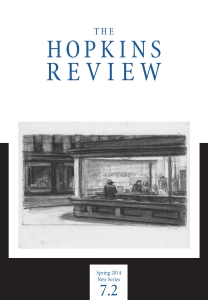 like to treat myself. And to me, this particular journal from our catalog of more than 80 provides slow-down-and-reflect moments in a hurry-up-and-do-something world. It’s a gift I enjoy all year, but appreciate most at this time when I have so many extra-festive elfish tasks.
like to treat myself. And to me, this particular journal from our catalog of more than 80 provides slow-down-and-reflect moments in a hurry-up-and-do-something world. It’s a gift I enjoy all year, but appreciate most at this time when I have so many extra-festive elfish tasks.
Why not treat yourself to a subscription to an academic journal this year? It may be the smartest gift you give yourself: time to consider a different perspective, time to think. As a graduate student in the Hopkins Writing program, my natural inclination would be to pick up the Sewanee Review, one of the most storied literary quarterlies in the United States. But wait, Studies in American Fiction offers a tasty smorgasbord of writers from a range of historical periods, and Callaloo serves up the very best original work by writers and visual artists of African descent worldwide. Callaloo Art, the new fifth issue devoted to visual art and culture of the African Diaspora, is simply an inspirational and lush read.
 Enough about me. If you are a historian, don’t you deserve Reviews in American History? It’s one journal that throws a window wide open on all areas of American history: culture, gender, law, politics, the military, and more.
Enough about me. If you are a historian, don’t you deserve Reviews in American History? It’s one journal that throws a window wide open on all areas of American history: culture, gender, law, politics, the military, and more.
If you are a health professional, you might have to sit down to make your pick: Bulletin of the History of Medicine will inform your work by providing a social, cultural, and scientific context for all kinds of medical practices and procedures. Journal of Health Care for the Poor and Underserved will spark your advocacy, and Narrative Inquiry in Bioethics will provide you with first-person patient and practitioner narratives that will do more than inform you—they will move you.
 Lest you think we’ve forgotten you, person-keenly-interested-in-all-things-French-and-medieval, we have the perfect gift: Digital Philology. With an electronic subscription, you can sit in your living room with your laptop and transport yourself effortlessly and immediately to the library of the Universidade de Coimbra in Portugal to study a little-known manuscript from the thirteenth century.
Lest you think we’ve forgotten you, person-keenly-interested-in-all-things-French-and-medieval, we have the perfect gift: Digital Philology. With an electronic subscription, you can sit in your living room with your laptop and transport yourself effortlessly and immediately to the library of the Universidade de Coimbra in Portugal to study a little-known manuscript from the thirteenth century.
My point is, take a vigorous, year-long intellectual adventure from the seat of your most comfortable armchair. From African American Review (African American literature, theatre, film, poetry and culture) to Feminist Formations (feminist, gender, and sexuality studies) to Victorian Periodicals Review (editorial and publishing history of Victorian periodicals), we’ve got an academic journal for you.
Why not feed your intellect and restore your soul this season by giving yourself a subscription?
Best of all, you don’t have to trek to the mall. Just click on the titles below or browse our entire collection.
African American Review
Bulletin of the History of Medicine
Callaloo
Digital Philology: A Journal of Medieval Cultures
Feminist Formations
Journal of Health Care for the Poor and Underserved
Narrative Inquiry in Bioethics: A Journal of Qualitative Research
Reviews in American History
Studies in American Fiction
The Sewanee Review
The Hopkins Review
Victorian Periodicals Review
Comments Off on Treat yourself this holiday season: subscribe to a JHUP JOURNAL!
Filed under African American Studies, American History, American Studies, Ancient, Bioethics, Caribbean Studies, Classics, Cultural Studies, Ethics, Gender Studies, Health and Medicine, History, History of Medicine, Journals, Journals, Literature, Women's History
A new book from a powerful voice for democracy
by Janet Gilbert Journals, Direct Response and Renewals Senior Coordinator
Speak with Marc Plattner about the state of democracy in the world today and you can almost see the neurons firing. His eyes light up as he speaks passionately, making sure we don’t miss an important new point or historical reference connected in the seemingly vast storehouse of his intellect.
Co-editor of the Journal of Democracy, he trudged through a snowstorm to keep his interview appointment at the Marriott Wardman Park in Washington, DC to discuss the just-released Journal of Democracy book, Democratization and Authoritarianism in the Arab World. Co-edited with his JOD colleague Larry Diamond, the book takes a scholarly, analytical, and compelling multifaceted view of the historic uprisings still sweeping over the Arab world.
This volume includes chapters examining several broad themes: the region’s shifting political culture, the relationship between democracy and political Islam, the legacy of authoritarian ruling arrangements, the strengths and vulnerabilities of remaining autocracies, and the lessons learned from transitions to democracy in other parts of the world. It also features chapters analyzing the political development of individual countries: Algeria, Bahrain, Egypt, Jordan, Libya, Morocco, Saudi Arabia, Syria, Tunisia, Yemen, and the monarchies of the Gulf.
Plattner acknowledges the risks of publishing a book on events that are still unfolding, saying “We felt that it was important to make available to a wider audience some of the best thinking about these critical events.” The result is a book with analyses and insights that are current, thought-provoking and insightful. It is available in paperback and in e-book.
Scholars, activists, and students will find this book as riveting as the snapshot provided in the newest installment of the Johns Hopkins University Press award-winning video series, In Other Words, below.
 Larry Diamond is senior fellow at the Hoover Institution and at Stanford’s Freeman Spogli Institute for International Studies, where he directs the Center on Democracy, Development, and the Rule of Law. Marc F. Plattner is vice president for research and studies at the National Endowment for Democracy. Plattner and Diamond are co-editors of the Journal of Democracy.
Larry Diamond is senior fellow at the Hoover Institution and at Stanford’s Freeman Spogli Institute for International Studies, where he directs the Center on Democracy, Development, and the Rule of Law. Marc F. Plattner is vice president for research and studies at the National Endowment for Democracy. Plattner and Diamond are co-editors of the Journal of Democracy.
Filed under Current Affairs, Foreign Policy, History, Journals, Journals, Middle East, Politics
August MUSE news
By Tashina Gunning, Project MUSE
Summer is the time of the year that those of us at Project MUSE begin to get a clearer idea of what our upcoming year will look like. By August, most of our new journal titles have been confirmed, and the ink is drying on contracts with our new publishers. So far, 2014 is shaping up to be a good year for MUSE.
We’re pleased to announce that nineteen new journals will be joining the MUSE collections in 2014. The new journals add content in a broad array of research areas, building on many of MUSE’s strengths and expanding the breadth and depth of our current subject offerings, with key title additions in area studies, literature, and philosophy, among others.
A nod to our friends north of the border: Canada seems to be quite the recurring theme in several of our new journals, including British Journal of Canadian Studies and International Journal of Canadian Studies, as well as the Canadian Review of Comparative Literature. Ghana Studies, Islamic Africa, and Journal of Haitian Studies make up other area studies journal additions, along with Great Plains Quarterly and Great Plains Research, both from University of Nebraska Press.
The Penn State Press’s Pacific Coast Philology is building on our literature collection, and our own JHU Press is adding to the roster as well, with ARIEL: A Review of International English Literature. New philosophy titles include Journal of Ayn Rand Studies, The Undecidable Unconscious: A Journal of Deconstruction and Psychoanalysis, and Journal of Japanese Philosophy. You can see a full listing of MUSE’s new 2014 titles on our web site. Stay tuned—rumor has it that there could be some more additions to this great group in the coming weeks.
Ten prestigious scholarly presses, including the recently-revived University of Missouri Press (check out the Q & A with the leaders of the movement to save the University of Missouri Press here) and the Hong Kong-based Chinese University Press, will be making their books available on the Project MUSE platform in 2014. Additional new-to-MUSE presses include three traditional university presses—Cornell University Press, University of California Press, and University of Minnesota Press—as well as the School for Advanced Research Press.
 MUSE’s new book publishers bring a variety of program strengths in MUSE’s core humanities and social science disciplines, including political science, cultural studies, anthropology, literary theory and criticism, Asian studies, and Indigenous studies. These publishers’ books will join the more than 23,000 scholarly titles that will be available on the MUSE platform by the end of 2013, and brings the total number of participating presses to well over 90. As with our journals, we do anticipate that this list will be growing in the very near future—so be sure to check back soon for updates.
MUSE’s new book publishers bring a variety of program strengths in MUSE’s core humanities and social science disciplines, including political science, cultural studies, anthropology, literary theory and criticism, Asian studies, and Indigenous studies. These publishers’ books will join the more than 23,000 scholarly titles that will be available on the MUSE platform by the end of 2013, and brings the total number of participating presses to well over 90. As with our journals, we do anticipate that this list will be growing in the very near future—so be sure to check back soon for updates.
Comments Off on August MUSE news
Filed under Behind the Scenes, Cultural Studies, Digital Content, E-Books, Journals, Journals, Libraries, Literature, MUSE, Philosophy, Publishing News, Uncategorized
Creating an Online Home
At times, the work in the marketing department of the journals division can seem a little disconnected.
You see, we have more than 80 journals spread around the world. We don’t actually produce the journals. We provide the support that (hopefully) helps the journals gain a larger subscription base and greater standing in the academic community. But we’re not on the ground floor with our editors as they create each issue.
That’s why I can’t wait to give a presentation this week at the American Association of University Presses conference on our efforts to create a digital presence for our journals.
The actual journal content for these publications exists on Project MUSE, so we have the task of creating a virtual space to shed light on what makes some of our journals or association partners so special.
The task has many more pitfalls than you might imagine. Each new website we create for a journal – or existing one we re-design – has a different reason for existing.
Maybe the editor wants a space to better explain the aims of a new journal. Maybe the journal has undergone massive change, including a new name and new editors, in recent years. Maybe the editor wants a place to help fill the gaps between issue of the journal.
All of these reasons have brought the marketing team together with an editor and the web team based in Project MUSE to give a journal a new online home. We have also created an entirely new association site (which won an award) and helped celebrate anniversaries.
Some might wonder why this matters. If the website doesn’t have journal content, what’s the point?
That’s what I hope to share with colleagues at AAUP. A journal encompasses so much more than what ends up on the printed page. A website can introduce new scholars to the publication, turning them into a subscriber. A website can showcase the ideals of the editors, prompting someone to submit an article. A website can answer basic questions in a uniquely designed space that makes a visitor feel like the editors do more than simply edit and publish essays.
The process of creating these online homes helps bridge the gap that exists in our daily work. I like knowing that we help our partners put on their best face for the rest of the world even if we’re hiding behind the scenes.
Filed under AAUP 2013, Behind the Scenes, Digital Content, Journals, Journals, Marketing
June news and new books
News and Notes
 Take a look at our new Fall 2013 catalog to see what’s in store for the coming season.
Take a look at our new Fall 2013 catalog to see what’s in store for the coming season.
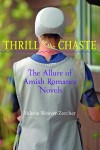 Valerie Weaver-Zercher, author of Thrill of the Chaste: The Allure of Amish Romance Novels, writes about ‘Why Amish Romance Novels Are Hot’ in The Wall Street Journal.
Valerie Weaver-Zercher, author of Thrill of the Chaste: The Allure of Amish Romance Novels, writes about ‘Why Amish Romance Novels Are Hot’ in The Wall Street Journal.
 Mark Bowden writes in the The Atlantic, “In a monumental and meticulous two-volume study of the 16th president, Abraham Lincoln: A Life (2008), Michael Burlingame . . . presents Lincoln’s actions and speeches not as they have come to be remembered, through the fine lens of our gratitude and admiration, but as they were received in his day. (All of the examples in this essay are drawn from Burlingame’s book, which should be required reading for anyone seriously interested in Lincoln.)”.
Mark Bowden writes in the The Atlantic, “In a monumental and meticulous two-volume study of the 16th president, Abraham Lincoln: A Life (2008), Michael Burlingame . . . presents Lincoln’s actions and speeches not as they have come to be remembered, through the fine lens of our gratitude and admiration, but as they were received in his day. (All of the examples in this essay are drawn from Burlingame’s book, which should be required reading for anyone seriously interested in Lincoln.)”.
Hot off the Press
The Secrets of Surviving Infidelity Recently interviewed on The Diane Rehm Show about infidelity and how it affects marriage, children, and families, author Scott Haltzman teaches readers that the secret to surviving infidelity can be summed up with one word: trust.
The Quick Guide to Wild Edible Plants: Easy to Pick, Easy to Prepare Coaches curious foragers on how to safely identify, gather, and prepare delicious dishes from readily available plants—and clearly indicates which wild plants to avoid.
On Depression: Drugs, Diagnosis, and Despair in the Modern World Lasting happiness comes not from chasing the American dream but from living an authentic life—which includes despair.
Managing Your Depression: What You Can Do to Feel Better A concise, practical guide to managing mood disorders for anyone suffering from these debilitating conditions.
Suing Alma Mater: Higher Education and the Courts This careful reading of six legal cases in American higher education is an essential primer for understanding contemporary litigation.
Transitions from Authoritarian Rule: Tentative Conclusions about Uncertain Democracies This reissue of what is widely known as “the little green book” features a new foreword by Cynthia J. Arnson, director of the Latin American Program at the Woodrow Wilson International Center for Scholars, and Abraham F. Lowenthal, founding director of the Latin American Program, who wrote the original volume’s foreword.
Journals News
Our podcast series visited recently with James Marten, who takes over as editor of the Journal of the History of Childhood and Youth this year. Marten joined us to talk about his plans for the new role as well as the progress of the Society for the History of Childhood and Youth. Subscribe to our iTunes feed so you don’t miss any episodes of the podcast.
The journal Narrative Inquiry in Bioethics has a new website at www.nibjournal.org. The site provides information about how to best use the four-year-old journal, as well as guidelines for authors and links to sample articles.
Connect with JHUP
Visit us online.
Sign up for our mailing list.
Filed under Academia, American History, Amish, Anabaptist & Pietist Studies, Awards, Biology, Botany, Coming Soon, Consumer Health, Current Affairs, Education, Emotional Health, Food / Cooking, For Everyone, Foreign Policy, Health and Medicine, Higher Education, History, Journals, Journals, Law, Literature, Mental Health, Politics, Popular Culture, Psychiatry and Psychology, Public Health, Publishing News, Regional-Chesapeake Bay, Reviews
Where research meets real life
by Janet Gilbert
Journals Direct Response and Renewals Senior Coordinator
How many of us have been sought out by a colleague, friend, or child making a difficult decision or processing a challenging event, and jumped in immediately with our own experience, advice, and judgment?
Simple, silent listening is extremely difficult, but crucial to understanding and effective leadership–in families and organizations alike. So it’s with particular pride that we are able to publish the only academic journal in bioethics that includes first-person narratives, enhancing research in a wide variety of areas: from psychiatric hospitalization to organ transplantation to autism spectrum disorders. Narrative Inquiry in Bioethics: A Journal of Qualitative Research is truly where research meets real life.
In a recent interview, editors James DuBois and Ana Iltis discuss the importance of hearing authentic human voices in shaping public policy. Have a listen.
Filed under Behind the Scenes, Bioethics, Education, Health and Medicine, Journals, Journals, Medical Education







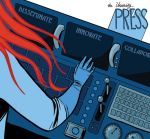








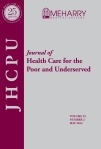
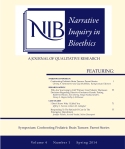

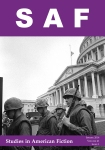
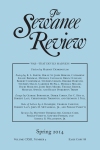

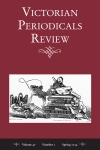







You must be logged in to post a comment.